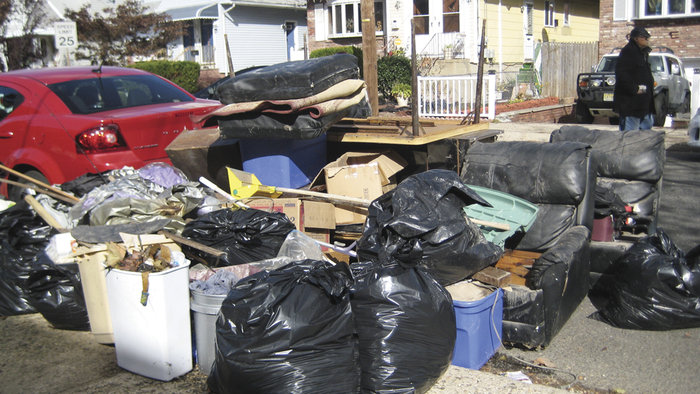When four feet of Hurricane Sandy’s floodwaters drained out of Kym Johnson’s Society Hill home, not only did they leave behind a ruined bedroom set, TV, and a closet full of clothes, they also left the remnants of Sable, Johnson’s home-based business.
Johnson launched her soap and bath products business as a hobby in 2007, and she decided to dedicate herself full-time to Sable in 2010.
“I wasn’t quite turning a profit yet, not to the point where I could pay myself a salary or anything like that. But I was breaking even on the cost of my supplies and had a small amount of money left over each month that I could reinvest in the company,” Johnson said.
She expected sales to improve as the economy strengthened and people had more disposable income to pay for $12 shower gel and organic lotion. Now, she’s wondering how the hurricane will affect her bottom line in 2012.
When flooding affects both one’s business and one’s home.
____________
Johnson is among several Jersey City residents dealing with the dual crisis of salvaging both their business and homes after flooding.
Throughout the worst hit areas of Jersey City, Hoboken, and New York, several established businesses remain closed three weeks after the storm and are still struggling to reopen their doors.
Last week, Tom Parisi announced that his Brightside Tavern – whose kitchen was completely submerged in floodwater – has reopened for business. But his sister restaurant, Tommy 2 Scoops, won’t reopen until the spring.
‘Precarious position’
As difficult as reopening will be for these establishments, home-based businesses like Johnson’s will face tougher challenges that are unique to micro-businesses.
“When you’re running a business out of your home, your profit margin is really thin and you aren’t really in a position yet to absorb the costs of a crisis or recreating your company,” said Yvonne Sloucher, who sells knitwear that is handmade by her mother and sister. Like, Johnson, Sloucher, who lives downtown, said much of her inventory was destroyed by flooding – just ahead of the winter and gift-giving season.
“I’m in an especially precarious position because a lot of our income came from customers who had commissioned us to make specific items as gifts,” Sloucher explained. “These customers pay for their items in advance; then my mom and sister make whatever was ordered. We’ll probably have to reimburse people for stuff that was commissioned and already paid for.”
Expensive yarns made of silk and cashmere had to be tossed out after they became soaked with mud. This stock will also need to be replaced at a heavy price, said Sloucher.
‘The lucky ones’
Nicole Keats, another downtown resident who lives near Sloucher, considers herself “one of the lucky ones.”
Keats runs a branding and public relations company from her ground floor apartment, which was also flooded by Sandy. Describing herself as “emotionally wiped out” from her ordeal, Keats still believes “it could have been worse. What I offer my clients is my expertise and experience. I don’t offer a product the way some other home-based businesses do. So, even though I lost one computer and furniture and some paper files that were in a file cabinet, I’ll still be able to keep working with my current group of clients without any real interruptions.”
Web designer Rob Bingham also considers himself “lucky. Two doors down that way, they flooded,” he said, pointing to his neighbor’s apartment. “Over there, they also flooded. I had a little bit of water but nothing like what I’ve seen elsewhere.”
Bingham, who also works out of his home, said he lost very little due to the hurricane, but he fears for the survival of his business nevertheless.
“My customers aren’t big corporations or big companies,” he said. “My client base is basically a lot of small start ups that, like me, are working out of their homes.”
A native of Long Island – another area hit hard by Hurricane Sandy – Bingham said most of his clients are people from back home.
“Some of these businesses owe money right now, but I’m not sure they’re going to be able to pay,” Bingham said. “And some businesses have already told me they may not get up and running again at full capacity for several months. These people are looking at having to replace everything – their homes, which are completely destroyed, and their home-based businesses. So, I understand. But as a micro-business myself, the loss or delay of this income will make it very hard for me to survive.”
E-mail E. Assata Wright at awright@hudsonreporter.com.
SIDEBAR
Disaster loans for Hurricane-affected businesses
The New Brunswick-based Intersect Fund is offering loans of up to $15,000 to small businesses that were affected by Hurricane Sandy. The fund is particularly interested in making loans to businesses that do not qualify for Disaster Loans offered by the Small Business Administration.
Loan recipients have up to 36 months to repay and will be charged 5 percent interest.
Loans can be used to replace lost or damaged inventory and to repair equipment. Eligible businesses must have at least $1,000 in monthly income; have no tax liens, civil judgments, or bankruptcies; and must have been current on their bills prior to the hurricane.
For more information, visit http://intersectfund.org/content/disaster-loans/ or call (800) 840-1900. – EAW
